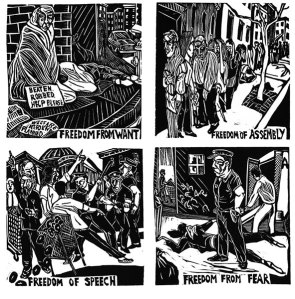By Morrigan Philips
Solidarity means that even if you win, you stand with everyone until everyone wins.
Poverty is, as the most basic definition states, the lack of resources sufficient for someone to live comfortably in society. For many, credit cards and loans have kept them in reasonable enough comfort that they have been able to put off acknowledging the grim realities of our economic system. Much of this myth of comfort and stability has fallen apart in recent years as the economic crisis has pushed more people into the uncomfortable position of realizing how close they are to a financial crisis of their own. Meanwhile, according to new poverty measures and census data, rates of poverty, particularly in rural communities and urban communities of color have risen to a 52 year high.
Complicated financial games and double speak mask much of what has been fueling the financial crisis. But as more and more people have found themselves with no work, no money and mounting debt problems, the financial tricks and gimmicks that have been keeping this wreck going seem more like smoke and mirrors.
Fueled by outrage over economic gluttony and seaming impunity on Wall Street, the Occupy moment took hold of a piece of anger lying deep in the hearts of masses of people. The proverbial pinch was being felt by too many. Pop! A would-be movement sprang forth representing those whom the promise of prosperity in exchange for hard work had been made and broken.
It should be made clear that Occupy Wall Street and the multitude of Occupies that have come alive around the US are not orchestrated nor primarily constituted by financially comfortable, gainfully employed, resource rich individuals. Plenty of unemployed, underemployed and broke ass people are taking on roles of organizers within Occupies. There are also those who rely on various forms of public assistance, both safety net programs like public housing and social security programs like unemployment. Further, the camps drew many from those forgotten and neglected corners of our communities: the houseless, those with mental health issues and substance use problems. Where camps remain these communities members also remain.
But to be clear – Occupy is not a poor people’s movement.

